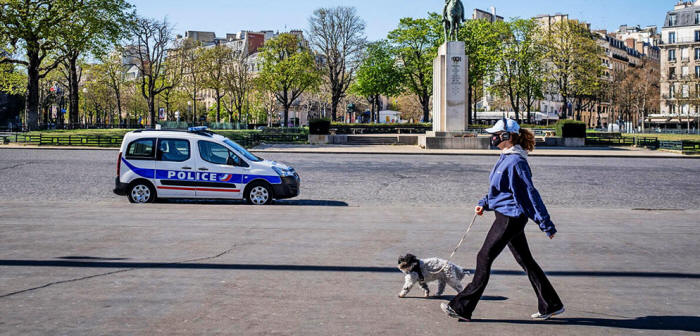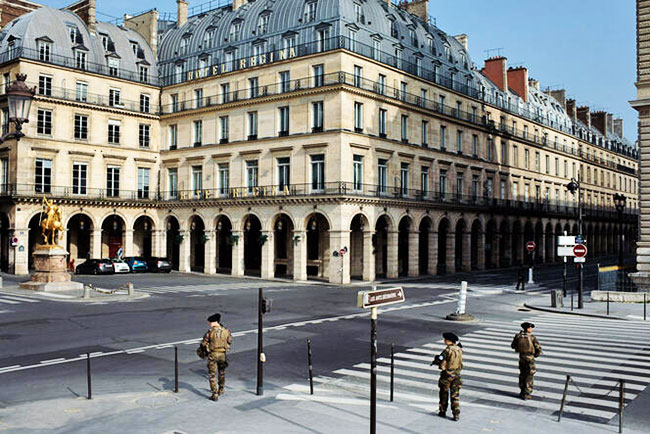N. M. (Nicolas Mariot)
Indeed, by a decree of March 23, prefects and mayors were
encouraged to "use all of their police powers" and to "adopt more
restrictive measures - than those taken at the national level - when
legal circumstances exist. 'require'.
And they did not hesitate to
use this power! Seventeen prefectures have established curfews for
people, thirty for businesses, nine departments having opted for
both; more than two hundred municipalities also established their
own curfews which overlapped - or not - with those of the
prefectures.
The limitation on outings has also been tightened:
eighty-three departments have set out restrictions on access to
places of nature and relaxation, sometimes with an incongruous
justification, such as "Containment is not vacation!".
Or with
absurd mentions, such as,
"the ban on buying a baguette or a single
newspaper at a time", or even "the ban on sitting on public
benches".
These various complementary measures have often led to a
break with one of the fundamental principles legitimizing
confinement:
the equality of all in the face of prohibitions.
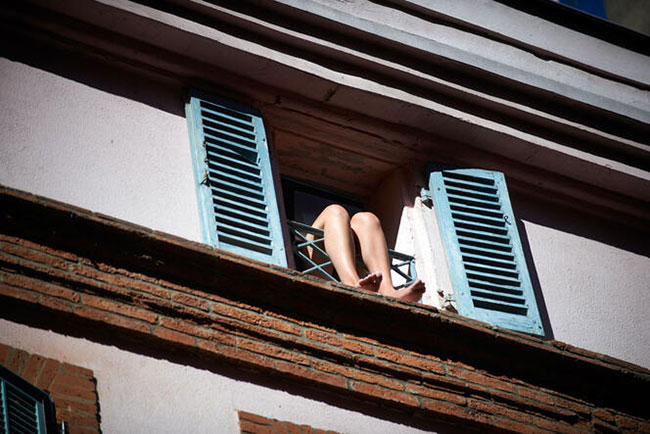
"Containment is not vacation!",
argued certain political
authorities
to justify the closure of green spaces.
Alain Pitton / NurPhoto via AFP
How can we explain that France chose to adopt such a coercive
policy?
N. M.
If Italy was the first European country exposed to the virus
to take drastic measures, the countries which subsequently adopted
the strictest rules were not more at risk, from a health point of
view, than the others.
The difference in reaction is clearly linked
to the coercive habits of governments:
we show that the more
European states have police officers per inhabitant, or the more
they are used to freeing themselves from public freedoms, the more
they have locked up their populations.
During this "pandemic", we have
therefore seen the resurgence of old habits of punitive population
management.
For France, this policy undoubtedly also demonstrated
the authorities' lack of confidence in the ability of residents to
follow the recommended policy.
The country was emerging from the
"yellow vest" crisis and demonstrations against pension reform, our
leaders probably feared a hostile reaction.
Have police checks been much more frequent in France than elsewhere?
N. M.
We are one of the rare countries to have introduced the famous
"exit certificate", presented as an accountability system but
quickly became a massive control tool.
Transform everyone into their
own policeman:
it is this device (borrowed from the Italians) which
made it possible to empty public space.
According to the "Life in
Confinement" (Vico) 4 survey, which we launched in April 2020 and in
which 16,000 people participated, 28% of people say they have been
checked at least once from March 17 to May 11, 2020, so in just 55
days!
"In two months,
21 million people were checked in France.
In certain
departments,
there were as many checks as adult residents!"
The Ministry of the Interior put forward the figure for the same
period of 21 million checks throughout France (for 67 million
inhabitants), including people who may have been checked several
times.
In departments like Sarthe or Lot, the police and gendarmerie
carried out as many checks as there were adult residents.
And for
the Lot, there are even more checks (153,000) than residents aged 15
and over (149,000)!
But the important thing is to understand what we
have called the "moral shock" of control.
While numerous surveys show that in
"normal" times it is the vast
majority of men, young and of a "foreign" appearance whose identity
is checked.
This time it was women, executives, people aged 30 and
over, almost never concerned, who were very widely controlled.
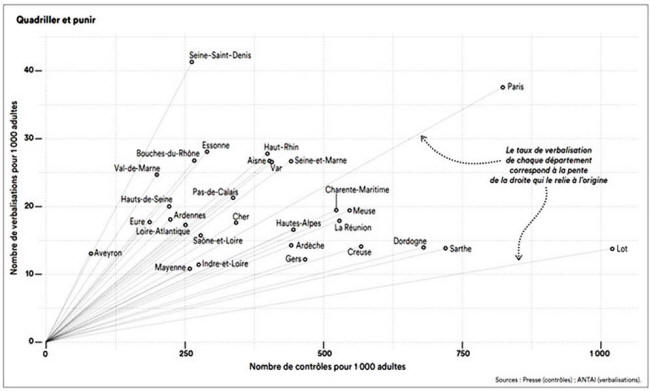
Some departments controlled a lot
and issued few fines (the Lot),
others controlled little but issued
a lot of fines (La-Seine
Saint-Denis).
Aurélie Boissière / Éditions Anamosa
Did these checks result in any fines?
N.M.
It depends.
In the Lot, to continue with this example, the
police were constantly patrolling but rarely fined. In
Seine-Saint-Denis, checks were rarer but 17% resulted in fines, one
of the highest rates in France.
In addition, the fines were
concentrated on four zones: the Mediterranean coast, the North and
Ile de France, the East and the overseas departments, once again
establishing a de facto inequality between citizens.
At the European
level, we were able to recover the number of fines in a few
countries.
Spain is at the top of the podium, with 2,157 fines per
100,000 inhabitants, followed closely by France (1,630), then Italy
(709), with the Netherlands coming in at the bottom, with 77 fines
per 100,000 inhabitants.
Not everyone has experienced the same
confinement, far from it.
How can we explain that the population has largely obeyed these very
restrictive rules?
N. M.
We had two hypotheses to explain why 80% of the population
agreed to stay locked up at home: fear of the virus and fear of the
police.
The Vico survey showed us that during this entire period,
there were never more than 50% of people who respected health
recommendations (putting on a mask, washing their hands, etc.).
So
the fear of the virus is not enough, in itself, to explain the
massive obedience to the rules.
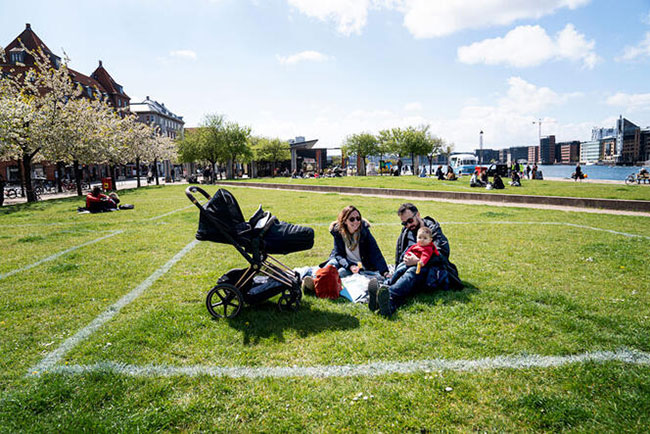
A family enjoys green spaces
in Copenhagen, Denmark, May 3, 2020.
Ten people can meet within a limit
of 40 m² marked on the ground.
Ida Guldbaek Arentsen / EPA / Newscom / MaxPPP
Furthermore, we must highlight a more horizontal dimension of
obedience, that which relates to comparison with others.
The fact is
that many people were concerned to set an example and/or to ensure
that their neighbors did not have a privilege, however small.
The
explosion of denunciations during the period (addressed to mayors,
police stations or local radio stations) is a sign of this
fundamental concern:
the rules are not called into question since
their application seems to leave no room for arbitrariness.
Finally, we must insist on the expulsion of all human presence from
public spaces:
bars and parks are closed, beaches and forests are
prohibited, night lighting is often removed.
All these measures
resulted in what we called "disquiet from outside."
For women in
particular, it has become distressing to venture into a deserted
space, for fear of an outside world that has become too strange.
At the international level, have other countries adopted more
draconian measures?
N. M.
We have all seen terrifying images of Chinese people locked
up, or violently evicted from their homes.
But it is necessary to
note a notable difference between China and France:
in the first
country, it is always a health reason which governs the enactment of
new rules.
Containment is applied in different provinces
successively depending on the spread of the epidemic, and
differently depending on the "negative", "contact case" or "infected" status of the people.
It never affects all citizens at
the same time and in the same way, unlike what happens in France.
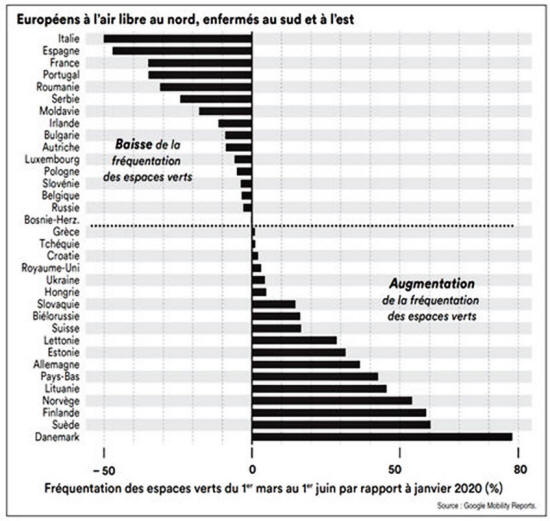
Thanks to geolocation data from Google,
made anonymous,
the
researchers were able to compare the use
of green spaces during
confinement, between March and June,
compared to January 2020.
Europe is then clearly divided into two:
the countries where we can
go out
and those where the inhabitants are locked up.
Aurélie Boissière / Éditions Anamosa
Finally, if I had to do it again, in which country would it be
preferable to reside?
N. M.
In countries which experienced a mortality deficit during the
period (yes, there are some), without imposing house arrest.
For
example,
Conversely, we would not go to,
But France is not much more attractive.
And
Spain was the country which experienced the most serious excess
mortality, 40%, while it is also the country which confined its
inhabitants the most... to finally declare this confinement
unconstitutional, and offer reimbursement of the fines to its
citizens.
What surprised you about this investigation?
N. M.
I was very surprised to see that no major media, but also that
no research team, in France and even, unless I am mistaken, in
Europe, was interested in taking stock of this period from the point
of view not health, but regulatory.
However, there are many lessons
to be learned from this experience, because we are not safe from a
new "pandemic".
Furthermore, with hindsight, we see that this
confinement, which was accepted because it concerned everyone
regardless of their social class, age, income level, place of
residence, was in fact relatively unequal in its terms of
application, due to the great freedom left to local authorities and
law enforcement.
Finally, as a historian specializing in the war of
14-18, I have already studied such an experience of obedience on a
large scale.
And I was surprised that a new form of sacred union
justifying suspension of freedoms and government without control
could be repeated almost a century later in the same way...


